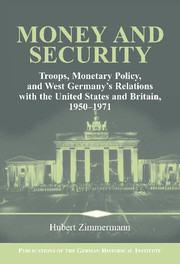 Money and Security
Money and Security Book contents
- Frontmatter
- Introduction
- 1 On Whose Shoulders? German Rearmament and the Cold War Burden
- 2 The British “New Look” and Anglo-German Relations
- 3 Adenauer and “Perfidious Albion”: Troop Reductions, Support Costs, and the Integration of Europe, 1957-1959
- 4 The Radford Plan: America and Its Troops in Germany, 1955-1958
- 5 The Political Economy of U.S. Troop Stationing in Europe
- 6 Offset and Monetary Policy During the Kennedy Administration, 1961-1962
- 7 The Bargain Slowly Unravels: Offset, Troop Reductions, and the Balance of Payments, 1962-1965
- 8 The Culmination of the Burden-Sharing Conflict: Chancellor Erhard’s Visit to Washington in September 1966
- 9 The Trilateral Negotiations of 1966-1967
- Conclusion
- Appendices
- Bibliography
- Index
2 - The British “New Look” and Anglo-German Relations
Published online by Cambridge University Press: 05 January 2013
- Frontmatter
- Introduction
- 1 On Whose Shoulders? German Rearmament and the Cold War Burden
- 2 The British “New Look” and Anglo-German Relations
- 3 Adenauer and “Perfidious Albion”: Troop Reductions, Support Costs, and the Integration of Europe, 1957-1959
- 4 The Radford Plan: America and Its Troops in Germany, 1955-1958
- 5 The Political Economy of U.S. Troop Stationing in Europe
- 6 Offset and Monetary Policy During the Kennedy Administration, 1961-1962
- 7 The Bargain Slowly Unravels: Offset, Troop Reductions, and the Balance of Payments, 1962-1965
- 8 The Culmination of the Burden-Sharing Conflict: Chancellor Erhard’s Visit to Washington in September 1966
- 9 The Trilateral Negotiations of 1966-1967
- Conclusion
- Appendices
- Bibliography
- Index
Summary
the origins of the british defense review
Indications that the British government would reopen the debate on troop costs multiplied during the late summer of 1956. In addition, rumors about impending reductions in British forces in Europe circulated widely. Overshadowed as those reports were by German rearmament problems and later by the Suez and Hungarian crises, they did not receive much attention. However, the contradictions between Britain's security policies, its monetary objectives, and its relations with Europe, the Commonwealth, and the United States were bound to emerge in the issue of British troops in Europe. This chapter discusses the support-cost negotiations of 1956-7 against the backdrop of the British defense review initiated in 1956. London saw itself confronted with difficult choices regarding its relations with the rest of Europe if it wanted to bring its economic resources in line with its security commitments. The consequences of these choices, which were reflected in the troop-level and support-cost debates, as well as in the failure of British arms exports to Germany, had a deep impact on British-European relations.
At the meeting of ministers of the North Atlantic Council in December 1956 the United Kingdom started a new round of support-cost negotiations. Macmillan, then chancellor of the exchequer, personally attended the meeting and gave a candid summary of Britain's situation. He emphasized the foreign-exchange problem facing the United Kingdom, the enormous resources it employed for defense worldwide, and compared this with West Germany's deficient military effort.
- Type
- Chapter
- Information
- Money and SecurityTroops, Monetary Policy, and West Germany's Relations with the United States and Britain, 1950–1971, pp. 45 - 68Publisher: Cambridge University PressPrint publication year: 2002
